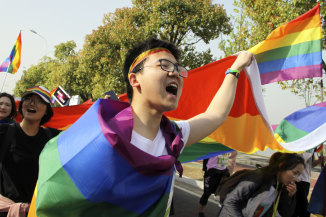So why the crackdown this year? It reflects official anxiety over the state of Chinese masculinity, but it’s also just one part of President Xi Jinping’s ever-widening agenda of repression.
China’s military hierarchy has long fretted that modern Chinese men, raised in “one child” families, lack the martial vigour to wage war. An influential 2010 paper by Admiral Luo Yuan railed against the “bad phenomenon” of effeminate men as an imminent disaster to the nation-state. Xi himself has said the collapse of the Soviet Union was because “no one was man enough” to hold it together.

That was then … more than 20,000 people take part in a “Rainbow Marathon” of gay activists in April 2018 to raise awareness of LGBT issues in Nanjing in eastern China’s Jiangsu province. Weibo.com announced at the time that it would no longer censor content related to gay issues after that plan triggered a loud public outcry.
Credit:AP
But the new intolerance of “sissies” and homosexuals is also a component of Xi’s quickening campaign against Western permissiveness more broadly. “Vulgar internet celebrities” also are persona non grata.
Minors are prohibited from playing more than three hours of video games a week, to be enforced through facial recognition and other high-tech surveillance. The teaching of English, long encouraged by the authorities, has been relegated.
Social media and internet companies are now required to write computer algorithms to “orient toward mainstream values and positive energy”. This is, of course, diametrically opposed to US social media business models that foment divisiveness and antagonism to win attention and drive revenue. In place of these unhealthy influences, Xi is reintroducing political study sessions and schools are required to step up the teaching of a subject called “Xi Jinping Thought” based on his eye-glazing, pseudo-philosophical collected works.
Loading
This recalls practices of the founder of Communist China, Mao Zedong, and his Little Red Book. “These are all things we thought we’d never see again,” says Brady, professor of political science at New Zealand’s Canterbury University. “Xi is running China in crisis mode, emphasising the external threat, just as Mao did. It’s depressingly familiar.”
Standing atop the giant portrait of Mao in Tiananmen Square on July 1, Xi told the centenary celebration of the Chinese Communist Party that China would no longer be “bullied, oppressed or subjugated” by foreign countries. “Anyone who dares to try will find their heads bashed bloody against a great wall of steel forged by over 1.4 billion Chinese people.”
And this socio-political rectification campaign is only one component of an even larger transformation under way. Xi is moving, erratically yet unmistakably, against private capital.
It started in November when he ordered the cancellation of what would have been history’s most valuable sharemarket float, Ant Financial, the night before. The reason? Its founder, one of China’s richest men, Jack Ma, had criticised the regulators. His entire business empire has since suffered and he disappeared from public view to reappear much chastened.
Loading
In recent months, Xi has launched regulatory assaults on a growing list of industries – technology, education, alcohol, video games, real estate and entertainment. The market capitalisation of China’s four biggest tech firms alone has fallen by about $US1 trillion, or almost half, since February. The suddenness, unpredictability and intensity of the crackdown has generated headlines like the one in London’s Financial Times last week: “Is China uninvestable?”
There is a clear ideological drive behind it. Xi last month inaugurated a campaign for “common prosperity”, a phrase originating in a 1953 People’s Daily call to collectivisation, according to David Bandurski of the China Media Project. It was a move against private ownership.
Xi has said China must limit “unreasonable incomes”. He has called on big companies to give money to social causes. None complained and many complied. Tencent, owner of WeChat and a major video gaming business, immediately donated $US7.7 billion.
It seems plain that Xi is determined to redistribute wealth. Only the exact scale and mechanisms remain to be disclosed.
Loading
The man who made China rich, Deng Xiaoping, said “it doesn’t matter whether [the] cat is black or white, as long as it catches mice”. China needed economic growth more than it needed ideological rigidity. In 1978 Deng smashed a system that strictly controlled which cat got which mice, breaking up China’s socialist system to allow market forces to operate.
Deng said he was “allowing a few peasants to get rich first”, instead of enforcing uniform poverty. Now, Xi has declared the Deng era has reached its limits. Private capital had spun out of control; Xi is taming it in the interests of “common prosperity”.
From the repression of “effeminate men” to “unreasonable incomes”, all the elements of what the party is calling the Great Transformation have one thing in common – they are all about tightening control. And that means they are all about Xi gathering power to himself.







